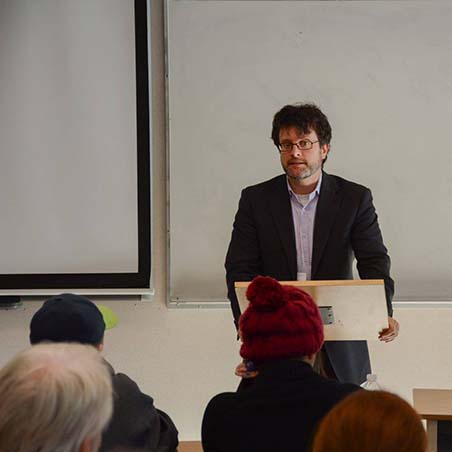Wilson Bell
Associate Professor, Department of Philosophy, History, and Politics - Thompson Rivers University
Bachelor of Arts (Hons.), History and Russian Studies, 2000
Learning is a process, it’s not a finished product—that’s one thing King’s really taught me.
Wilson Bell loves being in the classroom.
The father of two is an Associate Professor at Thompson Rivers University, but growing up in rural Nova Scotia, he says he “didn’t know what a thesis statement was” before attending King’s.
“A lot of (my students) are similar,” Wilson says. “It’s exciting to open their minds to ideas or events that they may not have heard about, and try to show them the relevance to their lives.
Wilson’s interest in history – Russian in particular – stems from lectures in the Foundation Year Program (FYP) at King’s. As an undergraduate, he studied abroad in St. Petersburg. After he completed his master’s, he returned to Russia and taught English at Moscow State University for a year.
Wilson’s career path wasn’t smooth, however. He was set to begin an internship for a company in Kyrgyzstan. His flight was scheduled for Sept. 14, 2001, but in the wake of the Sept. 11 attacks, the Canadian government was concerned about non-essential personnel in the region.
“I worked with the organisation that gave me the internship to find something else,” Wilson says. “I ended up teaching in Russia even though my original plan was an attempt to see if there was anything else out there. It must have been fate. If someone had told me at the beginning how difficult it is to get a tenure track job as a university professor, I might not have tried. I feel very fortunate.”
Since his master’s, Wilson has been receiving awards and funding for his work. He was most recently awarded a two-year Social Sciences and Humanities Research Council of Canada (SSHRC) grant valued at over $40,000 for his project, “44 Lenin Avenue: Siberia’s 20th century history as told through it’s most remarkable building.” The project has most recently received the SSHRC Insight grant, worth $55,000.
“They’re very competitive grants, so it was a surprise to get one, and exciting,” he says.
“Projects are judged by senior scholars in similar fields, so in a way the fact that they see this is an interesting project feels like I’m legitimate.”
The funding allowed Wilson to spend eight weeks in Tomsk, Siberia in summer 2016, where he expanded on his research.
As a historian, Wilson looks for the narratives in our everyday environments. “(I’m interested in) the role of space in history; what does the physical location of the building play in how it was involved in history over time?”
Wilson’s most recent book, Stalin’s Gulag at War (2019), grapples with the realities of Siberian gulags during the Second World War. The topic of the book actually has its roots in Wilson’s master’s research on archival newspaper articles from the Stalinist Era.
“Learning is a process, it’s not a finished product – that’s one thing FYP really taught me,” he says. “Even if you don’t understand something completely right away, keep it in the back of your mind and come back to it, and expand your knowledge base as you go through university.”
In tangible terms, FYP taught Wilson how to write, which he says was “crucially important” to his career.
“I try to view history as interdisciplinary, bringing in philosophy and literature and anthropology – a variety of ways of looking at the world,” he adds. “That also comes from the strong liberal arts foundation that King’s provides.”
As for the social aspect, Wilson still keeps in touch with friends from King’s.
“A smaller place like King’s can really foster friendships that make moving away from home and starting out on your own a little easier. You have family there,” he says.
Updated: Aug. 2020
 Connect with Wilson Bell
Connect with Wilson Bell